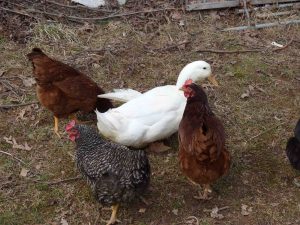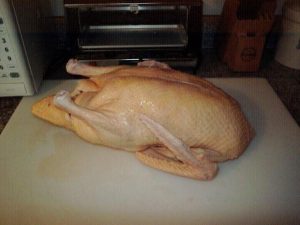Good timing is everything.
My chicken/duck coop is essentially finished – just in time for what may be coming, depending upon what the Black Robed Nine – it sounds like a synth band from the ’80s – “rule” this coming Friday, regarding the federal government’s power to sic OSHA (and eventually, other forms of Hut! Hut! Huttery!) upon the “unvaxxed.”
Those people – like me – who haven’t gotten sick through all of this and would like to avoid being made sick, via these “vaccines,” as the drugs which don’ immunize people who take them are curiously styled.
It doesn’t really matter which way the court “rules” because regardless, it is all coming to a head.
Best to get ready for that.
I began doing that last summer, when I started on the coop – where I now house a small flock of about a dozen ducks of mixed breeds and about the same number of chickens, also of various varieties. This seems to me a sufficient number of birds to provide both eggs and meat, ongoing – as there are enough birds to lay enough eggs and enough birds to eat some without not having enough birds to lay enough eggs to keep two people fed when there might otherwise not be enough – or even any – eggs or meat available at stores.
This balance will vary depending on your circumstances – and needs. A large family may need more birds; if it’s just you, fewer may suffice.
You will also want to factor in what it costs to keep birds – in food (for them) and time (from you).
In my area, winters are generally mild and so – excepting the occasional snowstorm (we just had one) my birds can forage – for free – in my backyard, with some supplemental feed, purchased by me. I generally go through two 50 pound sacks – $25 each – in a month.
So, $50 per month. But this saves me about $5 per week (the store-bought cost of a dozen eggs) and the cost of buying fresh chicken/duck. Have you priced either, recently? A duck – as in one – goes for $40, locally. Chicken about $15. (This is for non “downer” meat). I consider the $50 money well spent and recommend if you decide to get into this, to buy some feed ahead – for just in case. I always try to keep at least two 50 pound sacks in reserve, which gives me a month, at least, to come up with another way to feed them in the event feed is no longer available.
You will also want some straw – or similar – bedding, since birds are messy and it is important to change their bedding regularly, to keep them healthy. My coop was designed to make this chore as easy as possible, via two full-opening barn-type doors that provide complete/open access to the coop. It takes me about five minutes to muck out the old bedding (which I spread around the run, where it serves to soak up the mud – birds are messy!) and then spread some fresh bedding (hay).
You will also probably want electricity – and not just for lights (including heat lamps, if you live in an area subject to hard winters and extreme cold). Power is handy, to keep water from freezing. Birds need to drink – especially ducks, which need to drink in order to eat – and it’s hard for them to drink frozen water.
Places such as Rural King and Tractor Supply sell heated water buckets (or you can make your own) but they don’t work if they’re not plugged in. Which is why I am wiring my coop – one of the last things left to do. It will have one indoor outlet (with the usual two outlets) plus another mounted on the outside wall. The indoor is for interior lights – and heat – and the outdoor is for heating the water.
It’s a really easy thing to run a simple 15-20amp spur line from an existing line (or wired into the breaker box). A caveman can do this. And you’ll be thankful you did it, when it’s cold enough out to freeze water but your birds have unfrozen water. And you don’t have to chip away ice from their bucket.
There is one last thing left to do – which I haven’t been able to do – because the windows I ordered haven’t arrived. This isn’t just for looks, either – though that is reason enough. The birds are regulated by sunlight and windows provide that. Plus ventilation (in summer) which is also important for the health of your flock. I also discovered something else I was not formerly hip to, which is that without windows – and sunlight – the chickens are less apt to use the roost/perches I installed. In the dark, they prefer the floor – and their nest boxes.
Perching is better – for you – because it keeps the nest boxes cleaner, longer. If they bed down there, they’ll go to the bathroom, there.
Well, I am almost there. Almost done. Just have to finish the wiring – and install the windows. But I’m already ready – if the weaponized hypochondriacs “lock down” the stores – or there’s just no food in the stores, anymore.
At least as regards meat and eggs.
Vegetables – and fruit – are next on my docket!
. . .
Got a question about cars, bikes, or Sickness Psychosis? Click on the “ask Eric” link and send ’em in! Or email me at EPeters952@yahoo.com if the @!** “ask Eric” button doesn’t work!
If you like what you’ve found here please consider supporting EPautos.
We depend on you to keep the wheels turning!
Our donate button is here.
If you prefer not to use PayPal, our mailing address is:
EPautos
721 Hummingbird Lane SE
Copper Hill, VA 24079
PS: Get an EPautos magnet or sticker or coaster in return for a $20 or more one-time donation or a $10 or more monthly recurring donation. (Please be sure to tell us you want a magnet or sticker or coaster – and also, provide an address, so we know where to mail the thing!)
My eBook about car buying (new and used) is also available for your favorite price – free! Click here. If that fails, email me at EPeters952@yahoo.com and I will send you a copy directly!












Interesting, is it real? Or, Memorex?:
Anonymous Emergency Broadcast Message
https://www.facebook.com/AnonymousOffCircuitSec/videos/629671191615090/?extid=CL-UNK-UNK-UNK-AN_GK0T-GK1C&ref=sharing
If anyone were to try & build the water table I briefly described below I forgot to mention, all the sides have to be wire so the chickens can easily see, they are, after all, chickens, & won’t stretch their necks out if they can’t see well.
I filled the water bowl with feed for awhile to entice & train them as it was too hot outside to make the sudden switch. I imagine any new chickens will figure it out easily enough.
The side perches have to be just right, not too far away & not too close nor too high, allowing for an easy jump up.
Such a table is also a bonus for those who bending over is getting to be a chore, …or will be, someday.
Extend the top of the lid, overhang, so there’s a clean place to lift the lid from underneath.
Thought I’d mention that in light of this possibility which may be worse than only not being allowed into grocery stores:
“A number of experts have concluded that a large percentage of the vaccinated are going to experience disability and death. As Dr. Bhakdi explains, it doesn’t happen to everyone right away. Some experience death or disability immediately, some a month later, some a year afterwards, and some over a longer time.
As I understand it, the rate of death and disability of Covid vaccinated people will rise with time. If the process is rapid, one consequence could be societal collapse. If the process is slow, then those populations most vaccinated would experience numerical decline.”…
https://www.lewrockwell.com/2022/01/paul-craig-roberts/now-people-are-dying-from-the-vaccine/
Seems like all the specialist/tradesmen & farmers I know are vaxxed up. Being a Jack-of-all-trades may become a requirement for some time? Idk.
Some conflicting info. From what I’ve read, heat lamps are a no-no. A blast of cold air on a hot lamp & pop, glass everywhere & potential fire.
To heat, or not to heat, there’s lots about that online.
One of my guides is a big post by a fellow in Alaska over at Backyardchickens. He mentions opening windows in Winter & stresses having plenty of ventilation. As I recall, he does not have insulated or heated coops, neither do I.
Here in sub-zero Arctic-Iowa we have these wild birds around, they’re called pheasants. They do quite well outside, in snow & such. Chickens seem to be about the same. I try to keep that in mind.
The Alaska guy uses rubber bowls they sell in farm supply stores for water. He fills them up twice or three times a day. Just stomp on them to get the ice out. I’ve been doing that, it is a bit of a pain in the ass, however; until I get around to installing a heated water system, it works. And, rubber bowls are a great backup plan to have if there’s no power.
I made an elevated table/box with a hinged top lid to set the water bowl into. Used bits of wire fencing on the sides so the chickens can get water, yet don’t walk in the water & dirty it up. It’s working great so far.
I do not extend the daylight with lights in my coop, so far, it seems egg production is about the same as it was last Fall. Ymmv, I suppose.
I did have one fella tell me that if chickens have zero light, they will die as a result. I don’t know if that’s true or not.
I still need to make a better feeder. The trash can with 45 degree pvc pipes stuck into the bottom seems like the best method. Idk.
…Do chickens eat the powdery dust-like bottom leftovers? Idk.
Nice coop. It’s on my list for the future as I’m still at the vegetable gardening stage.
Eric, why did a pop up window state when I clicked on your site to “Check my Browser?” and do so for 5 minutes? Are you under some Federal Court order or surveillance? I found that weird and ominous. You host getting ready to pull the plug on your testy ass?
Sorry, 5 seconds… fat fingers and all.
Hi Cederq,
It’s an anti-spam filter; apologies for this – but we go bombed yesterday and nothing else worked. I’m talking “post” after “post” about pressure washing and such…
I saw the pressure washer spam. I thought it was something like that. I think someone is going after your site. Can’t let truth get out.
I think so, too –
Thanks to all for bearing with!
That makes sense Eric. I moderate and post over at Phil’s blog Bustednuckles and we have been having our share of a group of trolls that have latched on and decided we need their special kind of love and nurturing… One wonders what goes on in their minds to disrupt a bunch of old farts and car heads except to further aliniskys’s marxist plan.
We’ve kept backyard chickens for about 12 years now. It’s so fun to watch newbies coming into it all wide eyed.
We’re actually moving away from keeping them and in fact moving away from being too burdened with locality because I think mobility going forward is going to be more important for most of us who are not large enough operations to be truly self sustaining, as in you’ll need to be completely non-reliant on power, water, supply chains and be able to defend it against the hordes. I think it’ll be better if you’ve developed a relationship with a local farm at this point and focus on your specialty. Like be the community person who can repair engines for them or keep their solar generation working. Division of labor is what gave us the leisure to not all have to be islands upon ourselves and if we’re to survive the balkanization the world will need more than everyone having a few chickens in the backyard.
Anyway, chickens do not live long and take a lot of work to keep alive and get eggs consistently. Our flock hovers around 4 to 6 and requires supplemental heat (figured out during an unusual long cold snap in our southeast U.S. home a few years ago when lost the whole flock), heated water (which you already know about), at least 16% protein feed in winter (hens need plenty to make eggs), supplemental calcium (we use crushed oyster shells). Even if you do everything right they sometimes just get ill or die. They’re fragile and seems like every hawk, raccoon, cat and fox in a 5 mile range has a patrol schedule. A flock of hens can protect themselves from housecats but non-domesticated predators we find are best kept at bay with a dog (who’s notched one ‘coon in her life, along with being my wingman during duck season).
Also in the winter you need to use artificial light otherwise their body clocks will shut down laying. We found that you need to hide the mornings from them and turn their lights on very early if you have a coop that you intend to open to allow them out during the day. You can’t tell them to come in before sunset so you have to extend their “day” to start at like 3AM if you want steady eggs all year.
You’ll also find that you need to decide if you want laying hens or meat birds. A hen only really lays consistently for about 3 years. But when she slows and stops her body is pretty worn out from being asked to constantly make eggs so she won’t be much of a fryer (get a crockpot) by then. Even if you harvest her in her prime the best breeds for eggs aren’t usually meaty.
If you want the flock to be self sustaining you need a rooster but just one. More than one rooster becomes a real headache. Of course the male chicks can be meat but in commercial operations male chicks are usually culled since they tend to be aggressive (hard to keep) and wiry muscled. Most people don’t realize we mostly eat hens.